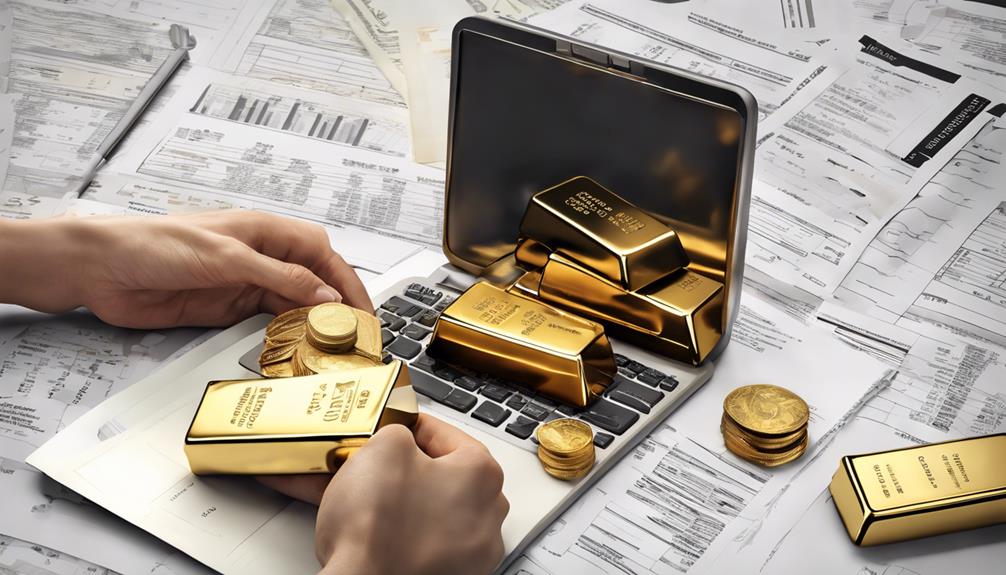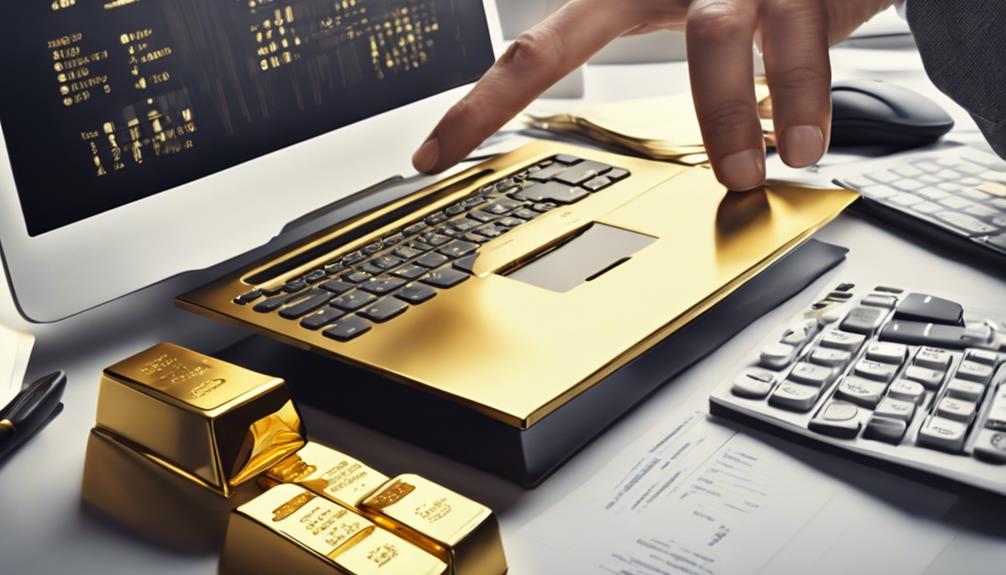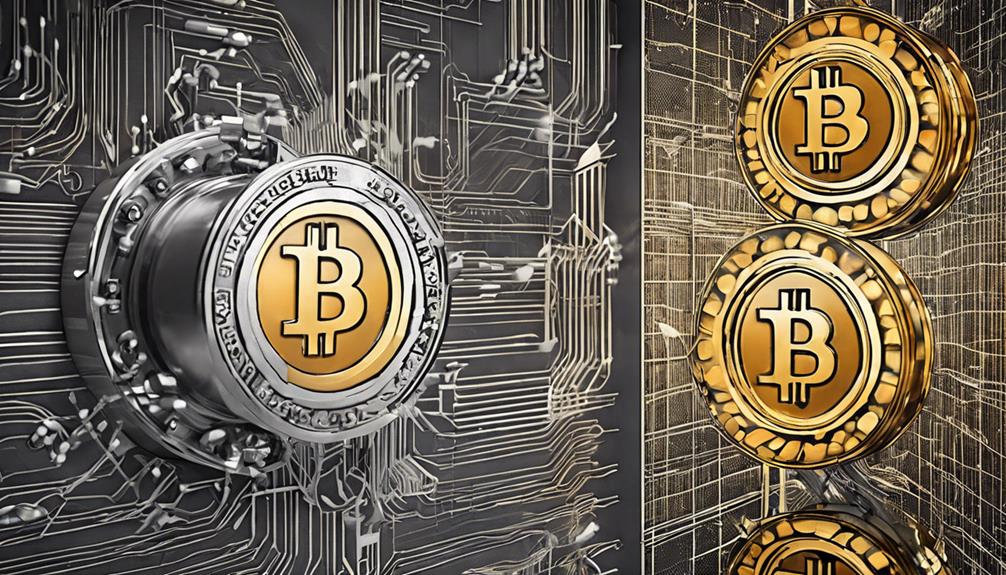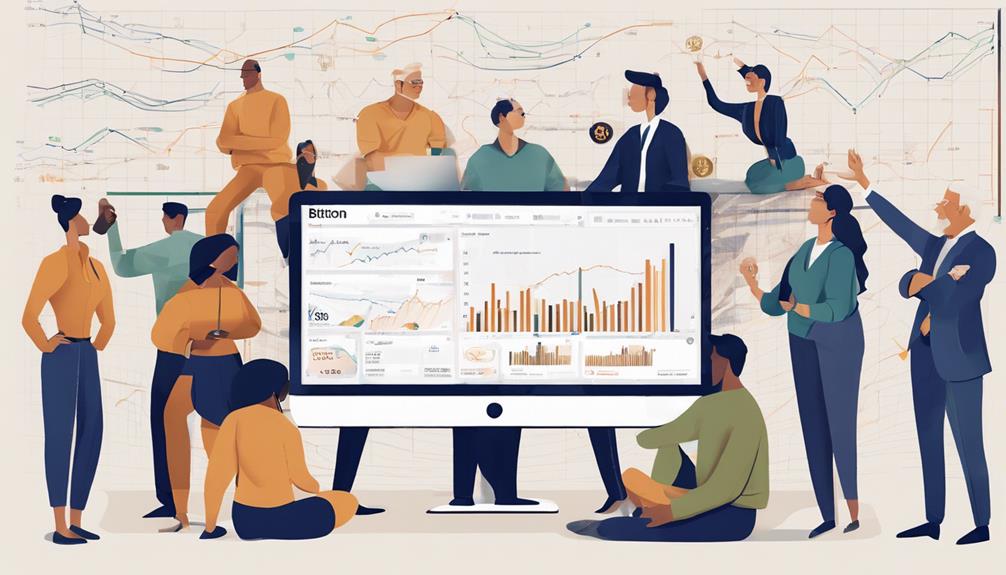To include physical gold in your IRA, set up a self-directed account with an IRS-approved custodian. Choose a custodian carefully, considering factors like reputation and fee transparency. Guarantee compliance with IRS rules when selecting and purchasing IRS-approved gold coins and bars. Fund your account through rollovers or transfers and diversify your portfolio with precious metals. Understand associated fees, including maintenance and setup charges before storing gold in secure depositories like the Delaware Depository. Safeguard your investment value by considering insurance coverage and security measures. Strategic steps are crucial for successfully integrating physical gold into your retirement portfolio.
Key Takeaways
- Choose an IRS-approved custodian for your self-directed IRA.
- Invest in IRS-approved gold coins and bars.
- Store your physical gold in an IRS-approved depository.
- Ensure compliance with IRS rules and regulations.
- Consider diversifying with silver, platinum, or palladium.
Signing up for a Self-Directed IRA
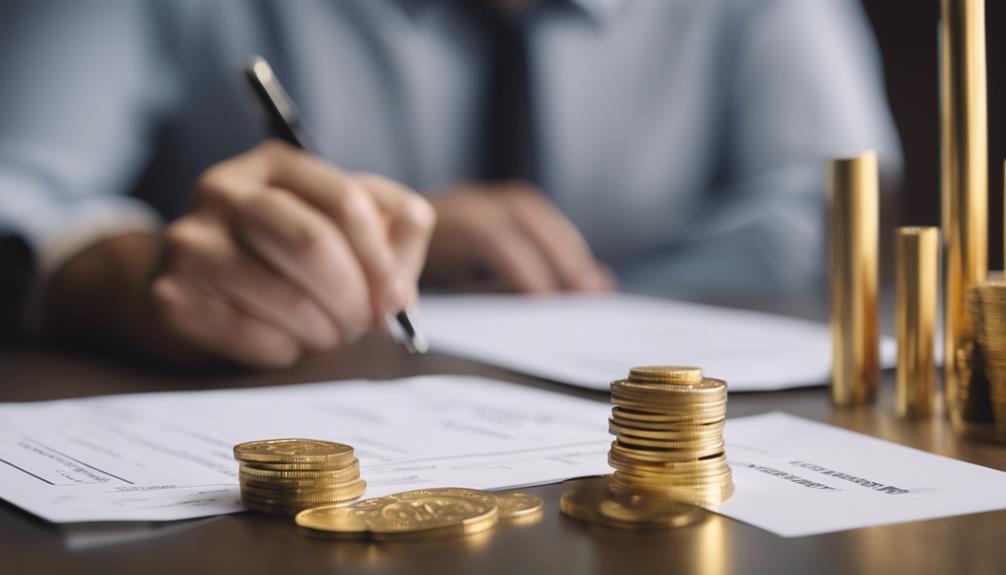
When signing up for a self-directed IRA, selecting an IRS-approved custodian is an essential initial step to include physical gold in your IRA investments. Self-directed IRAs offer the flexibility to invest in alternative assets like physical gold, giving investors more control over their IRA account. These IRAs enable individuals to diversify their portfolios beyond traditional investments. An IRA custodian plays an essential role in managing and holding the assets within the self-directed IRA, ensuring compliance with IRS rules and regulations.
Choosing the right IRA custodian is paramount to navigate the complexities of including physical gold in your IRA. An IRS-approved custodian will facilitate the process of investing in alternative assets within your self-directed IRA while adhering to the necessary IRA rules. By entrusting an experienced custodian with your IRA account, you can confidently explore a broader range of investment choices, such as adding physical gold to your portfolio for greater diversification and potential returns.
Choosing a Reputable Custodian Company

Selecting a custodian company with a proven track record in managing gold IRAs is essential for safeguarding and maximizing the potential of your investment in physical gold within your self-directed IRA. When choosing an IRA custodian for your Gold IRA, consider factors such as accreditation, reputation, and security.
It is important to make sure that the custodian offers a variety of IRS-approved precious metal options to align with your investment goals. Transparent fee structures are also necessary to prevent hidden costs that could erode your returns over time.
Some of the top-rated custodian companies for gold IRAs include Goldco, Augusta Precious Metals, American Hartford Gold, Birch Gold Group, and Noble Gold. Conduct thorough research and due diligence to find a reputable custodian that meets your criteria for managing your precious metals investment securely and transparently within your IRA.
Funding Your IRA Account

When considering funding your IRA account to include physical gold, depositing funds or transferring existing assets are common methods to initiate the process.
By contacting your current retirement plan administrator, you can start a rollover to fund your IRA account with physical gold.
It's important to complete transfers within 60 days to avoid a 10% early withdrawal penalty, and direct transfers between institutions can help prevent tax penalties.
Deposit Gold Funds
By acquiring IRS-approved gold coins or bars, individuals can effectively fund their IRA accounts with physical gold for investment purposes. Depositing gold funds into a self-directed IRA allows investors to diversify their retirement portfolio with a tangible asset that can act as a hedge against economic uncertainties and market volatility. Adherence to IRS regulations on approved precious metals is essential when funding an IRA with physical gold. Below is a table illustrating some of the benefits of depositing gold funds into your IRA:
| Benefits of Depositing Gold Funds into IRA | |
|---|---|
| Diversification of retirement portfolio | Hedge against volatility |
| Protection against economic uncertainties | Compliance with IRS rules |
| Tangible asset for long-term investment |
Transfer Existing Assets
To efficiently fund your gold IRA account, consider transferring existing assets from a traditional IRA or 401(k) through direct rollovers or trustee-to-trustee transfers.
Direct rollovers from qualified retirement plans can fund your gold IRA without taxes or penalties, while a trustee-to-trustee transfer guarantees seamless fund movement between accounts.
By funding your gold IRA with existing assets, you can diversify your retirement portfolio with physical gold. This strategy helps protect your savings from economic uncertainties and inflation.
Transferring assets to a gold IRA offers a way to safeguard your wealth and hedge against the impacts of inflation and market volatility, providing a secure foundation for your retirement savings in times of economic instability.
Selecting Precious Metals to Purchase
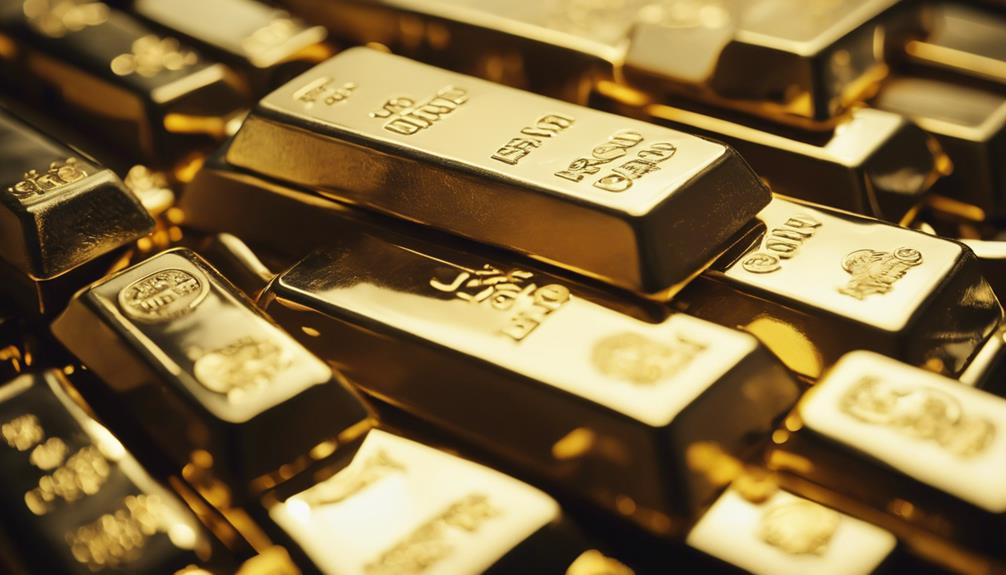
Selecting the appropriate precious metals for your IRA involves careful consideration of IRS-approved options such as gold coins and bars with specific purity requirements. When choosing precious metals for your IRA, it is essential to ensure compliance with regulations by selecting IRS-approved gold coins like the American Eagle and Canadian Maple Leaf. Additionally, consider purchasing IRS-approved gold bars that meet the purity requirements to maintain the integrity of your investment portfolio.
To make informed decisions, keep in mind that IRA-approved precious metals also include silver, platinum, and palladium, in addition to gold. Furthermore, verify that the precious metals you intend to purchase for your IRA are certified by recognized authorities to ensure they meet the necessary standards set by the IRS. Research the specific types of IRA-approved gold coins and bars thoroughly before making any purchases to safeguard your investment.
Markdown list:
- Choose IRS-approved gold coins like American Eagle and Canadian Maple Leaf.
- Consider purchasing IRS-approved gold bars with specific purity requirements.
- Ensure compliance with regulations by selecting certified precious metals.
- Verify that the precious metals are certified by recognized authorities.
Understanding Maintenance and Setup Fees
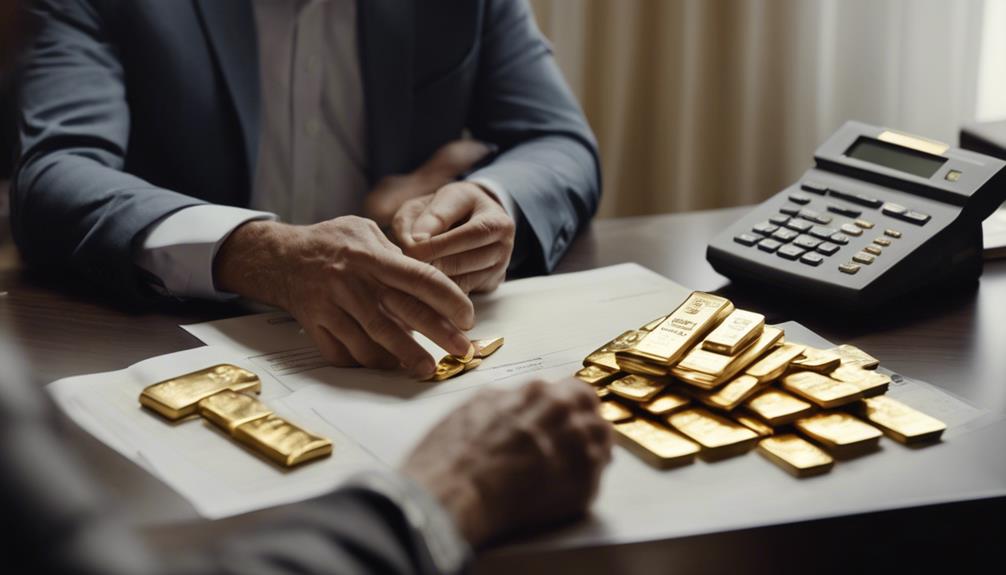
Understanding the costs associated with maintaining and setting up a Gold IRA is essential for effective retirement planning involving physical gold. When considering a Gold IRA, individuals should be aware of the annual fees ranging from $180 to $350 and the one-time custodian setup charges. It is vital to factor in these expenses when calculating the total cost of holding physical precious metals in a retirement account. Compliance with regulations often necessitates storing the physical gold in secure depositories like the Delaware Depository. By utilizing these secure facilities, investors can guarantee the safety and compliance of their Gold IRA holdings. Being mindful of the annual maintenance fees, setup charges, and the importance of secure depositories is fundamental for those looking to incorporate physical gold into their retirement planning strategy.
| Fees | Range | Importance |
|---|---|---|
| Annual Fees | $180 to $350 | Essential |
| Setup Charges | One-time fee | Fundamental |
| Secure Depositories | e.g., Delaware Depository | Compliance |
Storing Gold in Secure Depositories
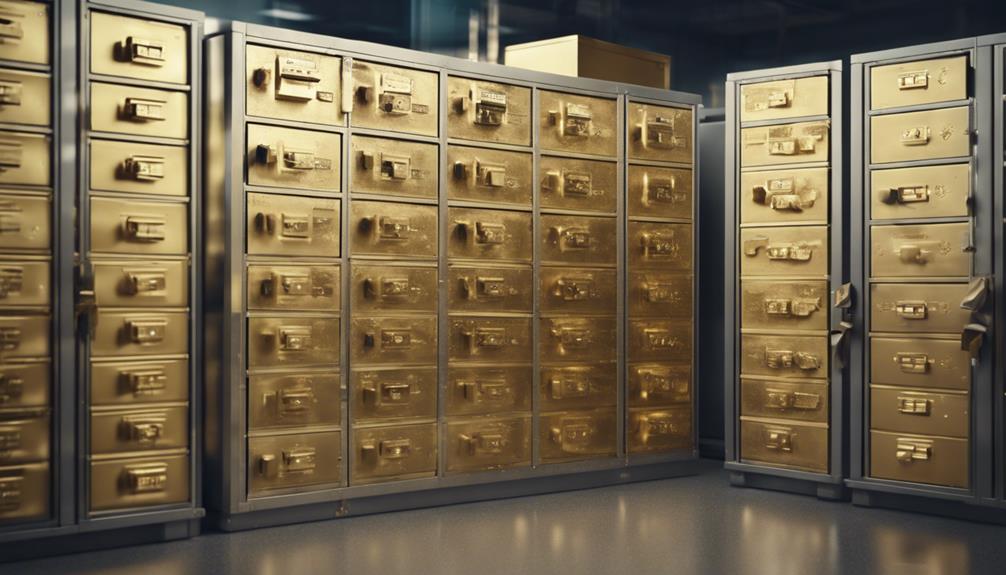
When contemplating storing gold in secure depositories for your IRA, it is vital to explore the options available for secure storage. Take into consideration the location of the depository and make sure that the stored gold is adequately insured.
Secure depositories offer a level of protection against potential risks such as theft or damage, making them a preferred choice for safeguarding physical gold assets within an IRA. Understanding the security measures, insurance coverage, and logistical aspects of storing gold in depositories is essential for maintaining the integrity and safety of your investments.
Secure Storage Options
For those thinking about the inclusion of physical gold in their IRA, utilizing secure depositories such as the Delaware Depository is a prudent choice to guarantee compliance with IRS regulations and safeguard against potential risks. When opting for secure storage options, it's important to take into account the following:
- Protection: Secure depositories offer protection against theft, damage, and loss of physical gold assets.
- Reputation: Choosing a reputable depository is vital for safeguarding your investment and maintaining its value.
- Maintenance Fees: Annual maintenance fees for storing gold in secure depositories typically range from $180 to $350 to ensure the safekeeping of your assets.
- Security: Storing gold at home is not recommended due to security risks and potential tax implications.
Depository Location Considerations
Considering the importance of safeguarding physical gold assets within a Gold IRA, the choice of depository location is a critical decision that investors must carefully evaluate. When selecting a depository, investors should prioritize IRS-approved secure depositories like Delaware Depository due to their compliance with IRS regulations and advanced security measures. These reputable depositories offer protection against theft, damage, and loss of stored gold through features like 24/7 monitoring, armed guards, and secure vaults. Insurance coverage provided by these facilities further guarantees the safety and integrity of the gold in a Gold IRA. Choosing a trustworthy depository location is essential for maintaining the value of the assets and adhering to IRS guidelines.
| Considerations | Importance | Examples |
|---|---|---|
| IRS-approved | Compliance assurance | Delaware Depository |
| Advanced security | Protection | 24/7 monitoring |
| Insurance coverage | Asset safeguarding | Thorough policies |
Insurance for Stored Gold
Safeguarding physical gold assets in a Gold IRA necessitates securing insurance coverage when storing the gold in approved depositories like Delaware Depository.
- Insurance coverage in secure depositories guarantees compliance with IRS regulations.
- The insurance typically covers the full market value of the stored gold, protecting investors against theft, damage, or loss.
- Storing gold in approved depositories offers a high level of protection and peace of mind for investors.
- Insurance for stored gold is an essential aspect of safeguarding precious metal investments within a Gold IRA, providing additional security and reassurance to investors.
Frequently Asked Questions
How Do I Add Physical Gold to My Ira?
When considering adding physical gold to your IRA, it is important to make sure you have a self-directed IRA that permits alternative investments such as precious metals.
To proceed, select an experienced custodian who specializes in managing gold IRAs. Acquire IRS-approved gold or precious metals and store them in an IRS-approved depository to comply with regulations.
Be mindful of associated costs like setup fees and annual maintenance charges to add physical gold to your IRA successfully.
How Is Gold Taxed in an Ira?
Gold held in an IRA is subject to specific tax implications depending on the type of IRA – traditional or Roth – and the timing of withdrawals. Withdrawals from a traditional Gold IRA are taxed as ordinary income based on the individual's tax rate. In contrast, Roth Gold IRA withdrawals can be tax-free if certain conditions are met, offering potential tax advantages.
Early withdrawals before age 59 and a half may incur a 10% penalty in addition to taxes.
Can I Hold a Gold ETF in My Ira?
Yes, you can hold a Gold ETF in your IRA. Gold ETFs are eligible investments for traditional IRAs, Roth IRAs, and other retirement accounts. They provide exposure to the price of gold without the need for physical ownership.
Investing in Gold ETFs offers liquidity, ease of trading, and potentially lower costs and fees compared to physical gold. Including a Gold ETF in your IRA can be a convenient way to diversify your retirement portfolio with gold exposure.
Can I Put Gold in My Roth Ira?
Yes, gold can be included in a Roth IRA, providing investors with an opportunity to diversify their portfolio and hedge against economic uncertainties.
By utilizing a self-directed Roth IRA, individuals can invest in physical gold, benefiting from potential tax-free growth.
It's important to consult with a financial advisor to make sure that including gold aligns with your overall investment strategy and long-term goals within the context of your Roth IRA.
Conclusion
To sum up, incorporating physical gold into your IRA can be a smart investment strategy. By following the steps outlined in this article, such as enrolling in a Self-Directed IRA, selecting a reputable custodian company, and choosing the right precious metals, you can secure your financial future.
Just as gold stands the test of time, integrating it into your retirement portfolio can provide stability and protection against economic uncertainties. Consider diversifying your IRA with physical gold to safeguard your wealth for the long term.
As our Lead Writer, Mia has a talent for turning complex ideas into compelling narratives. With a rich background in writing and a deep passion for psychology, Mia’s articles provide insightful, accessible explorations of narcissistic behavior and its impact on individuals and relationships. Mia’s contributions are thought-provoking and offer practical advice for our readers.

